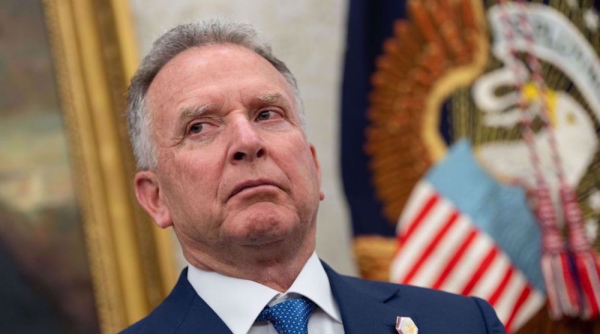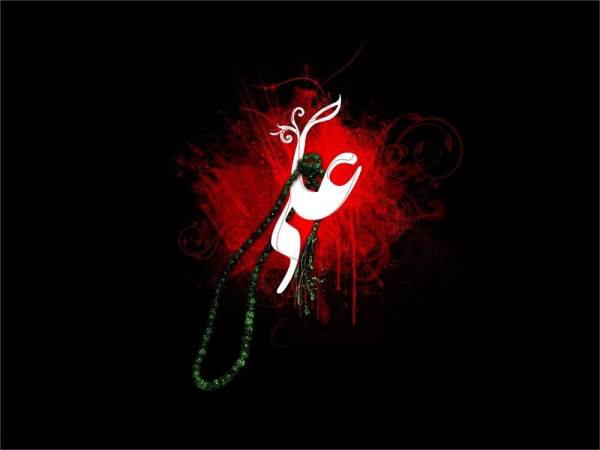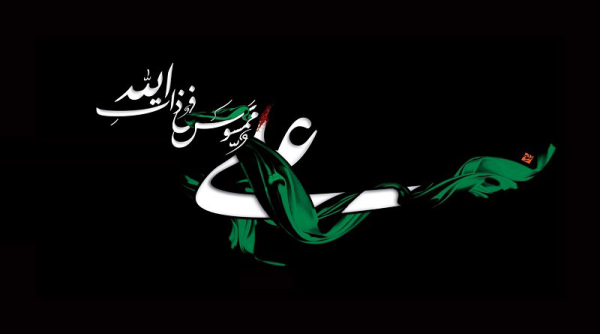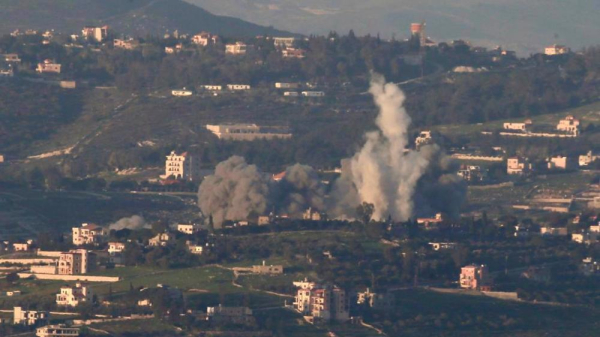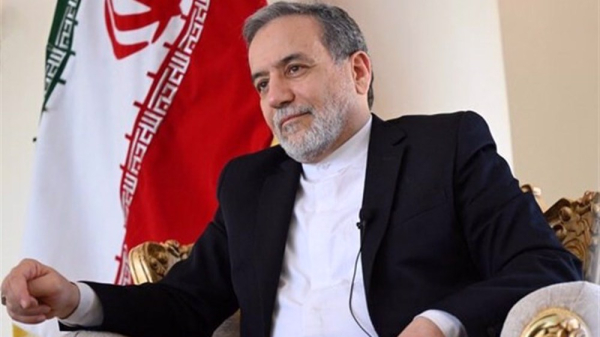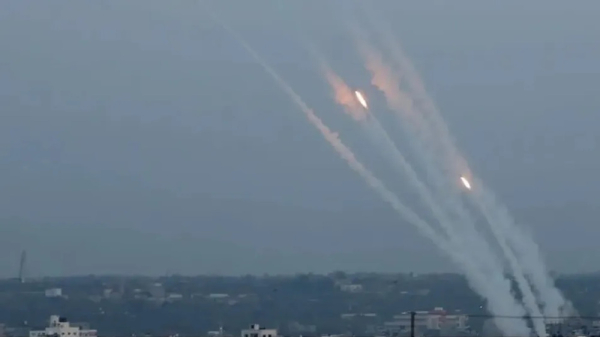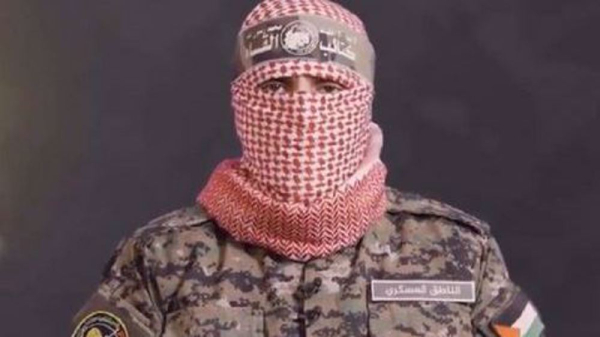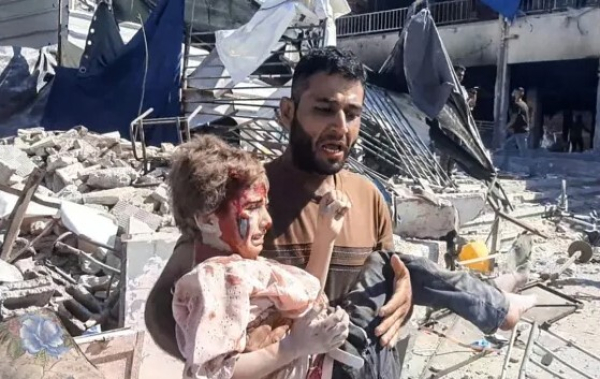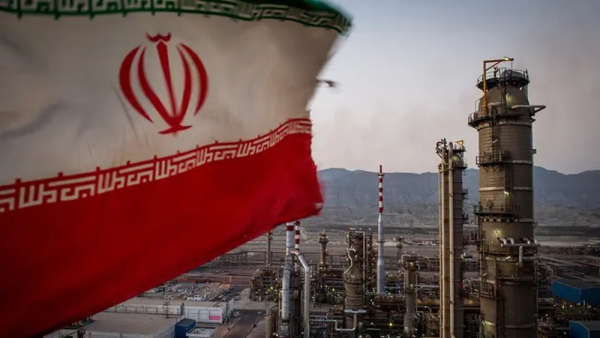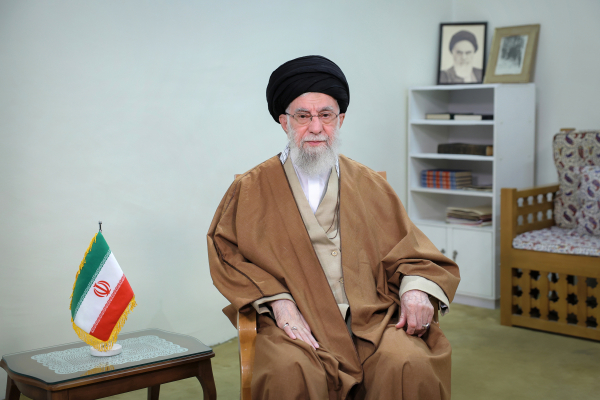zarezadeh
Envoy: Trump 'open to an opportunity to clean it all up with Iran'
The US special envoy to West Asia says President Donald Trump is “open to an opportunity to clean it all up with Iran" after his military threats were rebuffed by the Islamic Republic as getting them nowhere.
In an interview with American journalist Tucker Carlson published on X, Steve Witkoff touched on Trump’s recent letter to the Islamic Republic, saying it had not been intended as a threat and sought to build trust.
He was referring to the US president's letter delivered to Iran by a UAE envoy who visited Tehran on March 12.
Asked about the contents of Trump's letter, Witkoff said it roughly said, "There’s no reason for us to do this militarily. We should talk."
“We should create a verification program so that nobody worries about weaponization of your nuclear material… because the alternative is not a very good alternative.”
He said US discussions with Iran continue through “back channels, through multiple countries and multiple conduits.”
"I think he (Trump) wants a deal with Iran with respect. He wants to build trust with them, if it's possible," the US envoy added.
The remarks mark another flip-flop in the Trump administration's often hostile rhetoric tinged with the occasional tendering of an olive branch to Iran.
Trump announced on Feb. 4 a return to the maximum pressure campaign on Iran. On Monday, he signaled a significant escalation, threatening Iran over any operations carried out by Yemen against Israel.
Leader of the Islamic Revolution Ayatollah Seyyed Ali Khamenei said Friday that US threats against Iran "will get them nowhere," after Trump threatened the country with possible military action if it refuses to negotiate a new nuclear deal.
"The Americans should know threats will get them nowhere when confronting Iran," the Leader said in his live annual televised speech marking Nowruz, the Persian New Year.
He said Americans "and others should know that if they do anything malign to the Iranian nation, they will get a hard slap."
Earlier this month, Ayatollah Khamenei said Trump’s withdrawal from a nuclear deal in his first term renders diplomacy with him pointless, dismissing fresh overtures by Washington for a new agreement.
“The US president saying ‘we are ready to negotiate with Iran’ and calling for negotiations is a deception aimed at misleading global public opinion,” he told a group of students in Tehran.
The US, the Leader said, wants to portray itself as open to negotiations and making peace and Iran as not willing to accept it.
“What’s the point of negotiating when we know he won’t stick with it,” Ayatollah Khamenei said, referring to a 2015 international nuclear deal from which Trump withdrew.
Last week, Major General Hossein Salami, the chief commander of the Islamic Revolution Guards Corps (IRGC), warned that while Iran will never seek to initiate a war, it remains determined to deliver a resolute response to any threats or acts of aggression by the enemies.
Press TV’s website
The virtues of Imam Ali (peace be upon him)
The Holy Prophet of Islam (s.a.w.s.) says about the virtues of Imam Ali (a.s.):
If the trees were pens, the seas ink, the jinn were calculators, and humans were writers, they would not be able to count the virtues of Ali ibn Abi Talib.
In another narration, the Holy Prophet of Islam says about the virtues of Imam Ali:
Whoever wants to see the knowledge of Adam, the understanding of Noah, the patience of Abraham, the asceticism of Yahya ibn Zakariyya, and the strength of Moses ibn Imran, let him look at Ali ibn Abi Talib.
Another of the virtues of Imam Ali (peace be upon him) is that he was born in the Kaaba. When Fatimah bint Asad (peace be upon her), the mother of Imam Ali (peace be upon him), went into labor, she entered the Masjid al-Haram with divine inspiration and spoke to her God facing the wall of the Kaaba. Suddenly, the wall of the Kaaba split open and Fatimah bint Asad entered the Kaaba through the crack in the wall, and her beloved child was born in the Kaaba.
Martyrdom anniversary of Imam Ali
On the 19th day of the holy month of Ramadan, 40 AH, Imam Ali (AS) came to the Kufa Mosque for the morning prayer. Imam Ali (AS) called the call to prayer and led the congregation. Abdur Rahman bin Muljam, pretending to pray, stood behind Imam Ali (AS), and while Imam Ali (AS) was prostrating, Abdur Rahman bin Muljam struck Imam Ali (AS) with his poisoned sword and inflicted a deep wound on his head.
Imam Ali (AS) was martyred on the 21st of Ramadan, 40 AH, by an assassin who wounded the Imam with a poisoned sword during the morning prayer on the 19th day of the holy month of Ramadan in the Kufa Mosque.
On this sad and sorrowful occasion of the anniversary of the martyrdom of Imam Ali (AS), we extend our condolences to the Muslim community around the world.
I extend my condolences to the Muslims of the world on the tragic 21st of Ramadan, the martyrdom of the most complete and worthy person after the last and greatest Messenger of God for humanity, Prophet Muhammad (PBUH).
Israeli warplanes launch wave of attacks on targets in eastern, southern Lebanon
Israeli military aircraft have launched a series of airstrikes against areas deep inside the eastern and southern flanks of Lebanon, in the latest flagrant violation of a fragile ceasefire agreement with the Arab nation.
Lebanon's official National News Agency reported that Israeli warplanes struck the outskirts of Taraya village in the Baalbek district of the Baalbek-Hermel province, and the al-Shaara area near Janta at the foothills of the eastern mountain range.
In southern Lebanon, Israeli airstrikes hit the area between the Jbaa and Snaya regions with four missiles.
The Israeli military confirmed the strikes in a statement, alleging they were targeting infrastructure and rocket launchers belonging to the Hezbollah resistance movement.
“The Israeli army struck a military site containing an underground infrastructure site in the Beqaa (Valley) area in Lebanon,” the statement read.
Another Hezbollah site, containing rocket launchers in southern Lebanon, was also struck, it added.
Israel had to agree to a ceasefire with Hezbollah following significant losses incurred over nearly 14 months of conflict, failing to achieve its goals in the offensive against Lebanon. The ceasefire took effect on November 27.
Since the commencement of the agreement, the occupying forces have been carrying out near-daily assaults on Lebanon, breaching the ceasefire, which includes airstrikes throughout the Arab nation.
On January 27, Lebanon declared its decision to prolong the ceasefire with Israel until February 18.
Despite the February 18 deadline having passed, Israel persists in its occupation of five critical areas in southern Lebanon, which include Labbouneh, Mount Blat, Owayda Hill, Aaziyyeh, and Hammamis Hill, located near the border.
Lebanon has denounced the ongoing presence of Israeli military personnel, which constitutes a breach of the ceasefire agreement and the stipulated withdrawal timeline. High-ranking officials in Beirut have stated their intention to “employ all measures” necessary to expel the occupying forces from the Arab country.
Press TV’s website
Foreign Minister: Iran will respond to Trump’s letter
Iranian Foreign Minister Abbas Araghchi stated that the Islamic Republic will respond to the letter of US President Donald Trump in the coming days through appropriate channels.
Araghchi made the remarks while speaking during a live program on the Islamic Republic of Iran Broadcasting (IRIB) Channel 2 on Thursday.
Araghchi also noted that this time, the development comes alongside a diplomatic move from the Americans, including a letter and a request for negotiations.
He also stated that the Islamic Republic’s policy is clear. “We will not engage in direct negotiations under pressure, threats, or increased sanctions."
According to Araghchi, negotiations must take place on equal footing and under fair conditions.
The foreign minister also stated that the letter is “mostly threatening,” but it also claims that there are opportunities.
As per the foreign minister, the Islamic Republic’s response will take all dimensions of the letter into account.
“We have thoroughly examined all aspects of the letter, considering every detail carefully,” he stated.
“We will see both the threat and opportunity aspects,” said Araghchi, citing the Iranian anti-terror commander Lieutenant General Qassem Soleimani, saying, “Within every threat, there also lies an opportunity.”
In early March, Trump stated that he had written a letter to the Leader of the Islamic Revolution, Ayatollah Sayyed Ali Khamenei.
Later in February, Ayatollah Khamenei, in a meeting with Air Force personnel in Tehran, stated that experience has shown that negotiations with the US do not affect solving Iran's problems.
His remarks came hours after the US imposed its first sanctions in the wake of Trump’s signing of an order to reimpose his “maximum pressure” on Iran.
"Some people pretend that if we sit at the negotiating table, some problem will be solved, but the fact that we must understand correctly is that negotiating with the US does not affect solving the country's problems,” the Leader noted.
He also cited the experience of 2015 when Iran and six other countries, including the US, signed the now-dormant Joint Comprehensive Plan of Action (JCPOA) after two years of negotiations, only to be discarded by Trump in 2018.
Later, Iran’s President Masoud Pezeshkian reiterated Tehran’s openness to negotiations but emphasized that the Islamic Republic will not give in to the pressure of bullying powers and won’t engage in any negotiations under duress.
In May 2018, Trump pulled Washington out of a multilateral international agreement, formally known as the JCPOA, signed between Iran and the five permanent members of the United Nations Security Council plus Germany in 2015.
The UNSC-endorsed agreement required Iran to scale back some of its nuclear activities in return for the lifting of sanctions imposed on the country, especially by the United States.
Trump then imposed severe economic sanctions against Tehran while Iran was adhering to its commitments under the deal and even continued to do so for a year after the US withdrawal.
Press TV’s website
Al-Qassam Brigades hits Tel Aviv with a barrage of rockets
The military wing of the Palestinian Hamas resistance movement has launched a barrage of rockets from southern Gaza at Tel Aviv in retaliation for "Zionist massacres against civilians."
Hamas said it “bombed the city of Tel Aviv deep inside the occupied territories with a barrage of M90 rockets” in response to Israel’s attacks this week on Gaza.
"Takeoffs and landings at Ben Gurion Airport are disrupted due to rocket fire from Gaza," the Israeli regime's media said.
Following the occupying regime’s continuous violation of the ceasefire and the massacre of over 710 Palestinians within two days, Hamas on Thursday launched at Israel for the first time after the ceasefire.
The barrage served as a show of resilience from Palestinians despite more than a year of genocidal war conducted by the occupying regime.
The retaliatory strikes also come after the the Israeli military's renewed ground invasion into Beit Lahia on Thursday morning, and the failure of the mediators and the world to curb the IOF's aggression.
The Israeli regime ignored the ceasefire earlier this week by resuming aerial attacks on Palestinian civilians, which drew widespread condemnation.
It says it wants more hostages released.
The US, which has been acting as a mediator to extend the ceasefire, has thrown its weight behind the Israeli offensive. Karoline Leavitt, the White House spokeswoman, told reporters on Thursday that President Trump “fully supports Israel” and “the actions that they’ve taken in recent days.”
Press TV’s website
Hamas praises Yemenis for their 'direct' anti-Israeli support
The Palestinian Hamas resistance movement has praised Yemenis for their "direct" support against the Israeli regime.
"We salute our sincere brothers in Yemen for their honorable stance and direct support for the people in Gaza," Abu Obeida, the spokesman of Martyr Izz El-Din Al-Qassam Brigades, the military wing of Hamas, said on Thursday.
The spokesman said the honorable fighters in Yemen continue to support the defenseless people trapped in the Israeli regime forces' genocidal war against the Gaza Strip "despite the heavy price they are paying for their loyalty to Al-Aqsa and Palestine."
"Today, Yemen's missiles intersected with those from Gaza in the skies above 'Tel Aviv,'" he said after the Yemenis fired a ballistic missile at Tel Aviv on Thursday.
The Yemenis' attack on Tel Aviv proves once more that "Gaza is not alone, and that behind it are the free men of the nation who will not surrender it to their arrogant enemies," he added.
The spokesman of Al-Qassam Brigades called on the Muslim nation to defend Al-Aqsa against the zionist enemy.
"We call on all the free men of our nation to engage in the battle to defend Al-Aqsa and to continue their support for Gaza, to break the back of the criminal zionist enemy and force it to halt its aggression," he said.
Earlier this week, the Israeli war machine violated the shaky ceasefire and resumed its genocidal war against the Palestinian people, mostly women and children, trapped in the Israeli-besieged Gaza Strip.
The world community, including global leaders, UN officials and rights groups and people have expressed outrage over the resumption of the Israelis' barbaric aggression against Gaza which started in October 2023 and since then. has left about 50,000 defenseless Palestinians dead.
Meanwhile, the Israelis repeated violations of the truce, including land attacks and airstrikes resulting in the massacre of over 710 Palestinians within two days forced the military wing of the Palestinian Hamas movement on Thursday to launch several rockets at the Israelis. The attack was Hamas's first since the ceasefire went into effect in mid-January.
Press TV’s website
Trump 'fully supports' Israel's renewed violations in Gaza: White House
White House Press Secretary Karoline Leavitt
US President Donald Trump "fully supports" Israel’s renewed genocidal campaign in Gaza, White House Press Secretary Karoline Leavitt has said.
"President Trump fully supports Israel and the IDF and the actions they have taken in recent days," Leavitt said during a press briefing on Thursday, referring to Israeli occupation forces.
Leavitt's comments came two days after Israeli airstrikes targeted densely populated civilian areas in Gaza on Tuesday morning, with the death toll rising to over 970, according to Gaza’s Health Ministry.
Gaza’s civil defense agency also reported that more than 190 children were killed in the latest attacks.
Leavitt also cited Trump's previous threats against Palestinians, warning that they would face "hell to pay."
On Wednesday, Israeli Minister of Military Affairs Israel Katz echoed similar rhetoric, declaring in a video statement that Tuesday's attacks were “only the first step” and that harsher measures would follow.
He also reiterated calls for the "evacuation" of Palestinians, citing Trump's early February remarks advocating for the US to take over Gaza and remove its population.
"Take the advice of the US president," Katz said, adding that Palestinians face two choices, "relocate to other parts of the world" or endure "destruction and total devastation."
Israel resumed its air campaign early Tuesday with a series of deadly strikes, breaking terms of the ceasefire that took effect on January 19 between the Gaza-based resistance movement Hamas and the Israeli regime.
In response, the military wing of the Palestinian Hamas resistance movement launched a barrage of rockets from southern Gaza toward Tel Aviv.
Hamas stated that it had targeted the city "deep inside the occupied territories with a barrage of M90 rockets" in retaliation for Israel’s airstrikes.
Press TV’s website
US imposes new round of sanctions against Iran
The United States Department of the Treasury has imposed a new round of sanctions against Iran, targeting several entities, including independent Chinese teapot refineries, as well as vessels that supplied Iranian crude oil to these processing plants.
The sanctions were imposed on Thursday. The refinery targeted for sanctions is the China-based Shandong Shouguang Luqing Petrochemical Co., Ltd.
US State Department spokesperson Tammy Bruce stated that the refinery purchased oil from vessels linked to Yemen's Houthi movement, which the US designated this month as a Foreign Terrorist Organization. China is the largest importer of Iranian oil.
The US also placed Wang Xueqing, who is allegedly linked to the refinery, on the Specially Designated Nationals (SDN) List. Americans are prohibited from conducting business with individuals on this list, and their US assets are blocked.
Trump’s new administration has issued four rounds of sanctions against Iran since February, the latest of which also includes eight vessels carrying Iranian crude.
The US Treasury blocked vessels, including the Panama-flagged Aurora Riley and Catalina, as well as the Barbados-flagged Brava Lake.
Additionally, the State Department announced sanctions on a Chinese oil terminal, Huaying Huizhou Daya Bay Petrochemical Terminal Storage, for purchasing and storing Iranian crude oil from a sanctioned vessel.
These fresh sanctions are part of the US's "maximum pressure" campaign, aimed at reducing Iran’s oil exports to zero and ultimately undermining the Islamic Republic’s efforts to exercise the right to peaceful use of nuclear energy.
Iran has long been subjected to Western sanctions over its nuclear activities and other pretexts, the latest of which was imposed on Thursday, March 20.
The new sanctions come amid Trump’s claim that he is “ready to negotiate with Iran.”
Leader of the Revolution Ayatollah Seyyed Ali Khamenei nullified Trump’s overtures for a new agreement earlier this month, calling them a "deception aimed at misleading global public opinion."
“We sat down and negotiated for several years, and this very person took the completed, finalized, and signed agreement off the table and tore it up,” Ayatollah Khamenei said.
Earlier this month, the US Treasury Department also imposed sanctions on Iran’s Oil Minister, Mohsen Paknejad.
Press TV’s website
Imam Khamenei message in Nowruz 1404
Production experiences a surge when investments are made. Of course, investments should primarily be made by the people. The government must find various methods for this to be done. But in cases where people either lack the motivation or the means to invest, the government can step in – not in competition with the people, but as a substitute. In instances where the people don’t get involved, the government can enter the field and invest. In any case, investment in production is essential for both the country's economy and also for solving people's problems in livelihood. Improving people's livelihood needs planning and cannot happen without these sorts of preliminary measures.
It’s essential that both the government and the people seriously pursue and follow through with investments for production with firm resolve and motivation. The government’s role is to create the necessary environment and remove obstacles to production. The people’s role is to invest – both small and large investments – for the purpose of production. If capital is directed toward production, it will no longer be diverted into harmful activities such as buying gold, purchasing foreign currency, or other such endeavors. Harmful activities will stop. The Central Bank can play a role in this regard, and the government can also implement many effective measures. With this in mind, this year’s slogan is "Investments for Production," which will help to improve people's livelihoods, God willing. The government's planning in collaboration with the participation of the people will together, God willing, solve the problem.
I would like to briefly refer to recent events that have taken place during the past few days. The renewed attacks by the usurping Zionist regime on Gaza is a truly large, atrocious crime. The Islamic Ummah must stand united against this. They should set aside their differences on various issues. This matter concerns the entire Islamic Ummah. In addition to this, I urge all freedom-seekers around the world – within the United States itself, in Western and European countries, and in other countries – to strongly oppose this treacherous, horrendous act. Once again children are being killed, homes are being destroyed, and civilians are being displaced. The people must stop this tragedy.
Of course, the United States is also complicit in this tragedy. Experts in political issues worldwide concur that this action is being executed under the direction of the United States, or at the very least, with the approval and a green light from the US. Therefore, the US is also complicit in this crime. The same is true about the events in Yemen. The attacks on the people of Yemen and on Yemeni civilians is also a crime that must definitely be stopped.
We hope that Almighty God has ordained goodness, prosperity, and victory for the Islamic Ummah this new year. We hope that the Iranian nation can start this new year, which has just begun, with happiness, contentment, complete unity, and success, God willing, and maintain this spirit throughout the year. I hope the sacred heart of the Imam of the Time [Imam Mahdi] (may our souls be sacrificed for his sake), the pure spirit of the magnanimous Imam [Khomeini] (ra), and the blessed spirits of the martyrs are pleased and satisfied with us.
May God’s greetings, mercy, and blessings be upon you.
Sayyid Ali Khamenei
March 20, 2025
